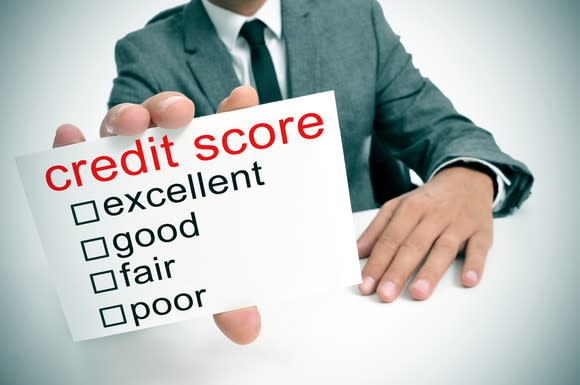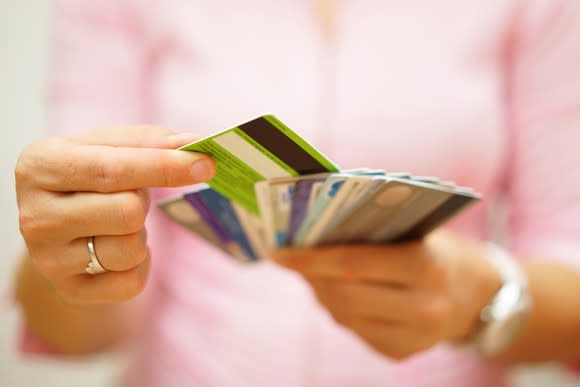How to Apply for a Credit Card -- and Which Is the Best One for You
You probably already know that it can be rather handy to have a credit card or two -- for the convenience whenever you want to buy something -- and also because credit cards can help you build a strong (or weak!) credit record and credit score.
You may be confused, though, about how to choose the best card(s) for yourself and how to apply for a credit card. To help you choose between this Visa or that Mastercard, here's a quick look at which features are best and how to deal with the application, online or off.

Image source: Getty Images.
Before the application: Is your credit score the best it can be?
You may not have given your credit score much thought, but it's rather important in your financial life. A high score can get you one of the best interest rates available for your mortgage, saving you tens of thousands of dollars over the life of the loan. It can also get you approved for the best credit cards -- the ones that offer generous cash back, lots of points and rewards, and even free nights in hotels.
Step back a minute, and consider your overall financial condition. Are you carrying a lot of debt? If so, and even more so if you're having trouble managing your debt, you may not be the best candidate for a credit card, as credit cards can make it very easy to get deep -- or deeper -- in debt. (There's an exception for those with debt and discipline, though -- a balance-transfer credit card, which we'll get to soon.) When you're deep in debt, you're paying hundreds, if not many thousands, of dollars in interest to lenders -- money that could have been put to far better use, such as for retirement savings, a new car, or a down payment on a home.
If you're financially disciplined and pay your bills off on time, you're a good candidate for a credit card -- but ideally, you still should have a strong credit score before applying, if you want one of the best credit cards, with the best features.
What's a strong credit score? Well, basic (non-industry-specific) FICO scores, which are used by about 90% of top lenders, range from 300 to 850. Here's how the folks at FICO rate the scores:
FICO Score Range | Rating |
|---|---|
800 and higher | Exceptional |
740-799 | Very good |
670-739 | Good |
580-669 | Fair |
579 and lower | Poor |
Data source: MyFICO.com.
If your credit score isn't high, you might want to delay filling out an application for a credit card, while you increase your credit score.
How to decide which type of card will serve you best
Okay, so if you're ready to fill out an application for a Visa or Mastercard or some other card, don't jump at the first offer you see. Spend a little time looking into which type of credit card will serve you best -- and then finding the best card for yourself in that category.
If you're in debt, you'll need to pay off credit card debt and any other high-interest-rate debt as soon as you can. Balance-transfer credit cards and low-interest rate credit cards can be good for that. Top balance-transfer credit cards will charge you no interest for a bunch of months while you work to pay off your debt, while good low-interest rate credit cards can help you spend less on interest payments.
If you're not in debt, consider getting a great cash-back credit card or two, with which you can receive a percentage of your purchases in cash or rewards. A particularly generous kind of reward card is the travel credit card, will reward you for your travel-related spending (often including restaurants) and/or will offer discounts on airfares, hotels, eateries, and more.
If you do a lot of shopping, online or in stores, think about where you spend the most money, as many retailers offer cards that give you discounts when you shop with them.

Image source: Getty Images.
Taking a closer look: the best credit card features
Once you know which kind of card is right for you, take a closer look at a few promising candidates. Here are the kinds of features to look for:
No annual fee. Most credit cards don't charge an annual fee, so it's easy to avoid this fee. Note, though, that sometimes a reasonable fee can be well worth it -- such as if a card charges $99 per year while offering $300 or more in value.
Big sign-up bonuses. Many credit cards offer hefty sign-up bonuses, with the magnitude of the bonus fluctuating over time. For example, a card might offer 50,000 "points" if you spend a certain sum within your first three months, and those points could be worth $500 or more in value when redeemed. This is especially true of travel-related credit cards.
Low interest rates. If there's a chance you will occasionally be carrying a balance, you should favor cards with an interest rate range that's low relative to others. If you're getting a card with an initial 0% rate, find out what the rate will likely be once that teaser rate expires.
No penalty APR. A penalty APR is what happens when card companies raise your interest rate, often to 25% or more, if you're late paying a bill. If you're carrying, say, $5,000 in debt with a 16% APR and your rate suddenly jumps to 30%, your annual interest cost can surge from $800 to $1,500. Plenty of cards don't have this feature, so look closely at the fine print and consider avoiding any cards that have it.
Zero percent interest. If you're looking for a good balance transfer card, aim for one that will charge you no interest for anywhere between about 15 months and 21 months. The longer the period the better, but in many cases, even 15 months can be enough.
No balance-transfer fee. Some balance transfer cards will charge you about 3% to 5% of the amount you transfer from another card. That can be substantial -- costing you around $180 to $300 on a $6,000 transfer. That can still be worth it sometimes, but favor cards that charge no such fee, at least in the initial period when you make your transfer.
No foreign transaction fees. A card with this feature won't slap you with transaction fees when you spend money abroad or with a foreign-based retailer.
Cash back -- or points or rewards -- that can be earned as you spend with your card. You can find plenty of cards that pay you 1.5% or 2% cash back overall on your purchases, and ones that offer up to 5% or 6% back on certain categories, such as supermarket spending. Some cards have pre-set cash-back rates for certain categories, while others rotate categories that earn extra-big rewards every three months -- sometimes even letting you choose the categories.
Travel perks. Some travel credit cards will give you access to VIP lounges in airports, while others might offer include roadside assistance and rental car insurance. Some cards will even reimburse you up to a certain amount for lost luggage.
Purchase perks. Many good credit cards offer extended warranties on qualifying purchases you make, and/or purchase protection, covering theft of or damage to an item you buy for a period of time. Some cards also offer price protection, refunding you the difference if you find a lower price for something you recently bought.

Image source: Getty Images.
At last: time to fill out the application
Once you know which card you want, it's time to fill out the application. If you're in good financial health with a solid credit score, this is likely to be the easiest step in the process. It's best to not get turned down for a credit card, as that decision will likely appear on your credit report, so aim for the kinds of cards suitable for someone with your kind of credit score.
You can start by looking up the card online. You can probably apply for it right there on its web page -- or you can download a form to fill out. If you haven't done sufficient due diligence into the card yet, this will probably be a good last chance to do so, as the application process should include showing you the card's features and terms in great detail.
The application process will require your divulging a lot of personal information, so be sure to be on a secure network and not filling out the form while using the free wi-fi at a coffee shop. You'll likely need to offer up your Social Security number, address, and income, among other things. If you have a mortgage, you may be asked about your mortgage payments.
If for some reason you're denied, call the company to ask what the problem was. You may be able to make your case verbally and put to rest any concerns it has. If you're told that there's a problem with your credit history, look into it. You're entitled to a free copy of your credit report annually from each of the three main credit agencies -- visit AnnualCreditReport.com to order yours. (It's a good idea to review your credit record before applying for a credit card -- and, indeed, to review it at least once a year, checking for errors.)
It's not hard for most people to get a credit card -- and it's important to be responsible with it. Used prudently, credit cards can put more money in your pocket and give you lots of other benefits -- while increasing your credit score, too!
More From The Motley Fool
6 Years Later, 6 Charts That Show How Far Apple, Inc. Has Come Since Steve Jobs' Passing
Why You're Smart to Buy Shopify Inc. (US) -- Despite Citron's Report
Selena Maranjian has no position in any of the stocks mentioned. The Motley Fool owns shares of and recommends Mastercard and Visa. The Motley Fool has a disclosure policy.
